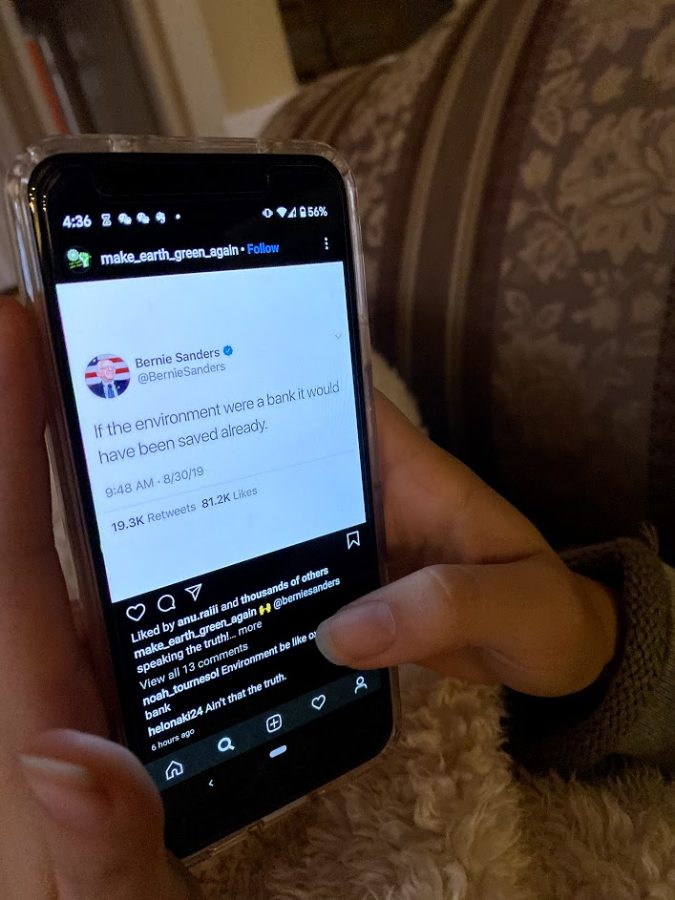Retweeting won’t save us: social media activism is not enough
Student views an Instagram post condemning the lack of action against climate change.
December 4, 2019
If you have social media, you’re no stranger to the countless activism floating around, ranging from petitions about climate change to furious hashtags about political debates. Everywhere you click or swipe, there is bound to be at least one person retweeting or sharing something that ultimately makes you feel inclined to do the same.
Social media activism is a way for people to advocate their views about a specific issue to create movement. Many people believe that using social media as a platform will essentially solve many problems, but this is not the case. Social media activism does actually very little in creating solutions for real-world issues, but activism away from screens do.
“I feel like social media activism is not the best option in dealing with things. It makes people aware, yes, but succeeding in creating change and actually doing something to solve the issue, no,” sophomore Megan Evans said.
Social media activism can be a very useful tool in spreading awareness, but it gives people the false impression that just by retweeting or liking something will lead to significant changes. It is a term called “slacktivism,” which is used for people who like to support a cause through social media but actually do very little in getting involved. A study by the University of British Columbia found that people who partake in public social media support—liking, retweeting—are no more likely to graduate to a more meaningful form of support in the future.
It is a perfect example of slacktivism and an example of why social media activism isn’t the best option to go to help create solutions. Social media can create a great first step on the route to solutions like it did for #MarchForOurLives, but it shouldn’t be the only thing activists solely depend on.
The movement March For Our Lives took place after the tragic shooting in Parkland, Florida, in 2018. To help raise awareness, students created an online website and prompted their negative views on gun violence on Twitter. But it was not the only thing that they did. If the students merely just kept tweeting at important people like President Donald Trump about what they thought needed to be changed, they wouldn’t have gotten very far. Instead, they also created protests and started the March For Our Lives movement, which invigorated millions of people to come together and fight. Social media activism created a great first step for them, but it wasn’t all the retweets and likes that would help solve the problem, but the yells of people marching who wanted to make a difference.
Many people seem to think that liking a particular post will save the planet. There used to be many posts floating around on Instagram, like on the account “tentree,” that would receive over millions of likes because, for every like they got, they would plant one tree. Many students said that this was a scam, yet many of them still liked the post and shared it. Students do this to feel good about themselves like they have done something to help. However, this is just another example of slacktivism, because students shouldn’t depend on strangers to plant a tree over what they press like on or watch. Students should be doing good instead of just feeling good, instead of leaving it to strangers who claim to save the earth with a single click.
Social media activism has made people think that all they have to do to help is share a post that claims to save the earth or like a post that is part of a fundraiser. People need to stop using social media as a cop-out and actually try to get involved. It could be joining an organization or even picking up litter in a park. There are so many ways we can try and solve several issues, big or small. But retweeting, liking, and sharing is not one of them.


